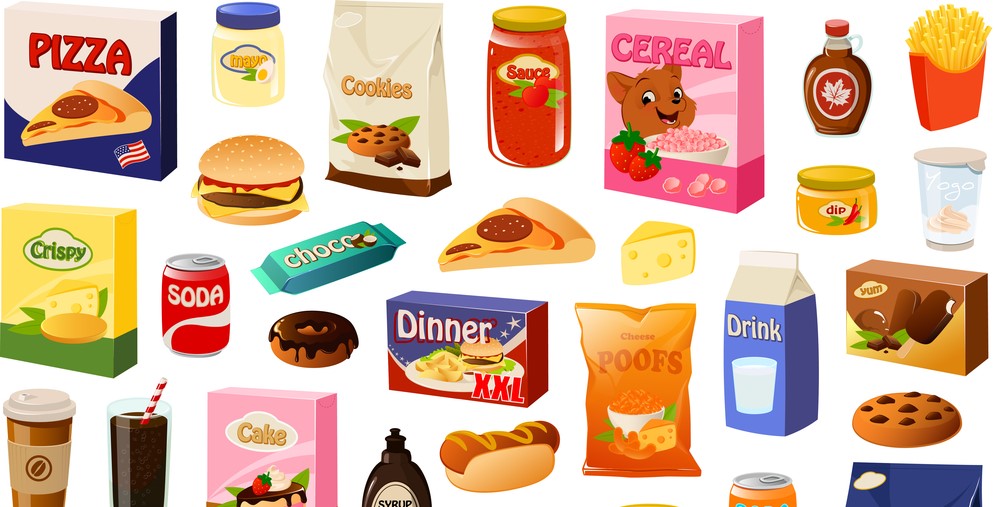
What are ultra-processed foods?
Ultra-processed foods are foods that contain mainly industrially-derived ingredients rather than whole foods. (Whole foods would be what you would typically see in a kitchen - fruits and vegetables, whole grains, meat and fish, legumes, nuts and seeds, and eggs). They are designed to be made with low-cost ingredients, taste delicious and have a long shelf life. They are easily marketable and recognizable by the public. Their industrial ingredients come mainly from modifying corn, wheat, soy, cane sugar, and animal carcasses, and they usually also contain other food additives like food coloring, artificial flavoring, emulsifiers, salt, added sugars, or preservatives. The result is a colorful and delicious food product that is ready to eat from the package or needs very little cooking to prepare, and contains little to no nutritional value. Some examples you might see in the grocery store or at home would be sodas, packaged snacks, chips, sugary cereals, cookies, ice cream, frozen meals and fast food.
What do ultra-processed foods do to the body?
Ultra-processed foods are designed to taste delicious and be addictive so consumers will continue to buy them. A study recently published by the National Institutes of Health (NIH) found that 73% of the current U.S. food supply is ultra-processed and 60-70% of a typical American’s diet is made up of these super convenient, ultra-processed foods. Unfortunately, these foods contain little to no actual nutrition from dietary fiber, vitamins, minerals, or phytonutrients, so the typical American diet is lacking in the necessary dietary fiber, vitamins, and minerals needed for optimal health.

What are some of the health risks associated with eating these foods?
The more ultra-processed foods we eat, the less nutrition we actually end up getting and issues like poor digestion, constipation, irritable bowel syndrome (IBS), increased hunger, and weight gain become more prevalent. Scientists are even seeing correlation between ultra-processed foods and higher rates of cancers, mental health issues, metabolic syndrome, diabetes, elevated blood pressure, and heart disease so it is definitely a good idea to choose less of these foods overall.
How do you know if you are eating ultra-processed foods?
Look at food labels and read the ingredients list. The goal is to choose a product with the fewest ingredients. With the exception of fresh vegetables and fruits, starchy roots and tubers, chilled and unseasoned and unmarinated fresh meat and fish, eggs, spices, and plant oils. When reading the list of ingredients, see if you can find anything you don’t recognize or would never find in a kitchen on its own. These ingredients are usually in the middle or towards the end of the ingredient list. Look for highly-technical or chemical-sounding names like high-fructose corn syrup, fruit juice concentrates, invert sugar, maltodextrin, and dextrose; hydrogenated, partially hydrogenated, or interesterified oils. Also, see if you can find any cosmetic additives like artificial colors and flavors, thickeners like guar gum, carrageenan, and xanthan gum; or preservatives like ascorbic acid, sorbic acid, benzoic acid, sulfites, and nitrites. If you do not automatically know what the ingredient looks like, then it is probably industrially made and the food is ultra-processed.
Advertising for and labels on ultra-processed foods can sometimes include buzz words like “organic” and “natural,” however that may not always be true or mean that it is a healthier option. Buy foods that are plain rather than pre-seasoned or flavored, and add your own blend of spices, herbs and/or sweeteners.

Are all processed foods bad?
Some processed foods can actually be very beneficial to you. One example is whole grain bread. Technically, mass-produced breads and rolls are considered ultra-processed. (There are many production steps before a stalk of wheat becomes a slice of toast!) If you choose a bread product that contains no added sugar and has a high amount of dietary fiber, (close to 20% daily value on the food label) then that could be a food product worth including in your diet. There are many nutrition studies showing that some processed foods, like yogurt, can reduce your risk of chronic health conditions like cancer, heart disease, and diabetes. In the end, it is best to limit your processed food intake to ones that contain minimal ingredients, and aim for an overall diet that is predominantly plant-based and includes whole grains and lean proteins.
Many people buy processed foods to save time. What are some tips on how to avoid them?
The biggest reason ultra-processed foods have become so prevalent in the last 50 years is a decline in home cooking. You can enhance your nutrition by making a commitment to eat at home more often. Prepare larger batches of things that you and your family like to eat often. Items like pasta sauces, egg bites, sandwiches, or main/side dishes can be made in large quantities and the leftovers frozen for future meals. Many foods can be stored for several months and reheated in minutes for days when schedules are busy. You can also buy pre-chopped or par-boiled ingredients, like beans and lentils, veggies, lean proteins, and whole grains, that only require that you season and finish cooking. At the end of the day, meals and snacks do not have to be complicated or big productions in order to be delicious and nutritious. If there is a food you really enjoy, see if there is a less processed version or easy recipe available that you can try instead.

How should you handle processed foods when eating out?
If you eat out regularly, try exploring beyond the fast food options. Look for restaurants and cuisines in your area that include more vegetables on the menu. Consider foods that are baked, poached, stir-fried or grilled rather than deep fried. Wherever you are eating, consider dining with friends and family more often. Studies show that people who dine together regularly have better eating habits and enjoy more vegetables, fewer sodas, and less deep-dried food.

by Michele Daniele, RDN, Sansum Clinic Nutrition Department
Registered Dietitian Michele Daniele >
Sansum Clinic Nutrition Department >